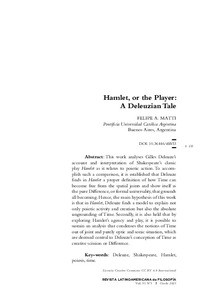Please use this identifier to cite or link to this item:
https://repositorio.uca.edu.ar/handle/123456789/20026| Título: | Hamlet, or the Player: A Deleuzian Tale Hamlet, o el jugador: una historia deleuziana |
Autor: | Matti, Felipe A. | Palabras clave: | Deleuze, Gilles, 1925-1995; Shakespeare, William, 1564-1616; POIESIS; TIEMPO; Hamlet | Fecha de publicación: | 2025 | Editorial: | Centro de Investigaciones Filosóficas | Resumen: | This work analyses Gilles Deleuze’s account and interpretation of Shakespeare’s classic play Hamlet as it relates to poietic action. To accom-plish such a comparison, it is established that Deleuze finds in Hamlet a proper definition of how Time can become free from the spatial joints and show itself as the pure Difference, or formal universality, that grounds all becoming. Hence, the main hypothesis of this work is that in Hamlet, Deleuze finds a model to explain not only poietic activity and creation but also the absolute ungrounding of Time. Secondly, it is also held that by exploring Hamlet’s agency and play, it is possible to sustain an analysis that condenses the notions of Time out of joint and purely optic and sonic situation, which are deemed central to Deleuze’s conception of Time as creative scission or Difference. Este trabajo analiza la interpretación de Gilles Deleuze de la obra clásica de Shakespeare, Hamlet, en relación con la acción poética. Para realizar tal comparación, se establece que Deleuze encuentra en Hamlet una definición adecuada de cómo el Tiempo puede liberarse de las articulaciones espaciales y mostrarse como la pura Diferencia, o universalidad formal, que fundamenta todo devenir. Por lo tanto, la hipótesis principal de este trabajo es que, en Hamlet, Deleuze encuentra un modelo no solo para explicar la actividad poética y la creación, sino también el desfundamento absoluto del Tiempo. En segundo lugar, también se sostiene que explorando la agencia y el juego de Hamlet, es posible sostener un análisis que condensa las nociones de Tiempo fuera de las articulaciones y situación puramente óptica y sónica, las cuales se consideran centrales para la concepción de Tiempo de Deleuze como escisión creativa o Diferencia. |
URI: | https://repositorio.uca.edu.ar/handle/123456789/20026 | ISSN: | 0325-0725 1852-7353 |
DOI: | https://doi.org/10.36446/rlf453 | Derechos: | Atribución 4.0 Internacional | Fuente: | Revista Latinoamericana de Filosofía. 2025, 57(1) |
| Appears in Collections: | Artículos |
Files in This Item:
| File | Description | Size | Format | |
|---|---|---|---|---|
| hamlet-player.pdf | 163,92 kB | Adobe PDF |  View/Open |
This item is licensed under a Creative Commons License

